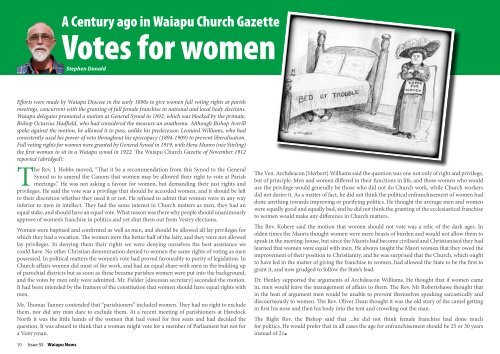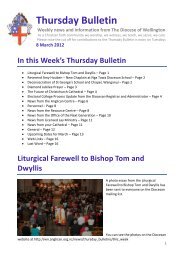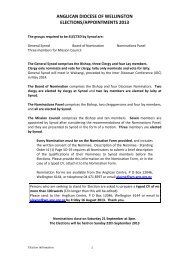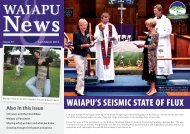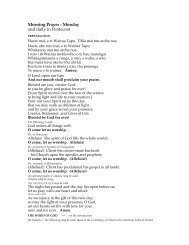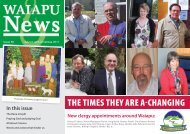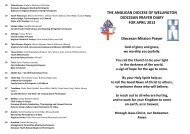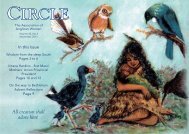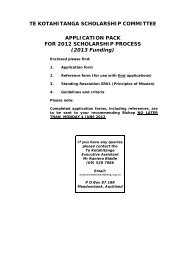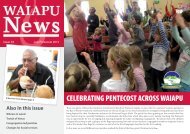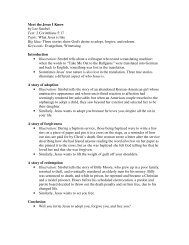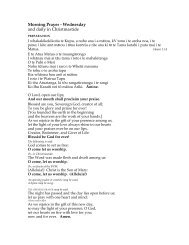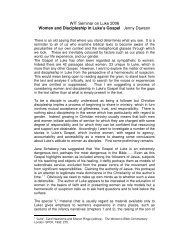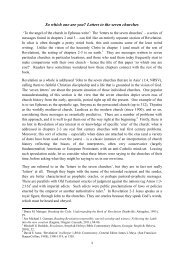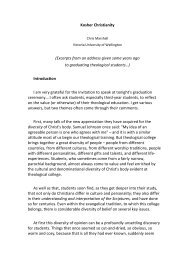ANGLICANS IN AOTEAROA - Waiapu Anglican Social Services
ANGLICANS IN AOTEAROA - Waiapu Anglican Social Services
ANGLICANS IN AOTEAROA - Waiapu Anglican Social Services
You also want an ePaper? Increase the reach of your titles
YUMPU automatically turns print PDFs into web optimized ePapers that Google loves.
A Century ago in <strong>Waiapu</strong> Church Gazette<br />
Votes for women<br />
Stephen Donald<br />
Efforts were made by <strong>Waiapu</strong> Diocese in the early 1890s to give women full voting rights at parish<br />
meetings, concurrent with the granting of full female franchise in national and local body elections.<br />
<strong>Waiapu</strong> delegates promoted a motion at General Synod in 1892, which was blocked by the primate,<br />
Bishop Octavius Hadfield, who had considered the measure an anathema. Although Bishop Averill<br />
spoke against the motion, he allowed it to pass, unlike his predecessor, Leonard Williams, who had<br />
consistently used his power of veto throughout his episcopacy (1894-1909) to prevent liberalisation.<br />
Full voting rights for women were granted by General Synod in 1919, with Hera Munro (née Stirling)<br />
the first woman to sit in a <strong>Waiapu</strong> synod in 1922. The <strong>Waiapu</strong> Church Gazette of November 1912<br />
reported (abridged):<br />
The Rev. J. Hobbs moved, “That it be a recommendation from this Synod to the General<br />
Synod so to amend the Canons that women may be allowed their right to vote at Parish<br />
meetings.” He was not asking a favour for women, but demanding their just rights and<br />
privileges. He said the vote was a privilege that should be accorded women, and it should be left<br />
to their discretion whether they used it or not. He refused to admit that women were in any way<br />
inferior to men in intellect. They had the same interest in Church matters as men, they had an<br />
equal stake, and should have an equal vote. What reason was there why people should unanimously<br />
approve of women’s franchise in politics and yet shut them out from Vestry elections.<br />
Women were baptised and confirmed as well as men, and should be allowed all lay privileges for<br />
which they had a vocation. The women were the better half of the laity, and they were not allowed<br />
lay privileges. In denying them their rights we were denying ourselves the best assistance we<br />
could have. No other Christian denomination denied to women the same rights of voting as men<br />
possessed. In political matters the women’s vote had proved favourably to purity of legislation. In<br />
Church affairs women did most of the work, and had an equal share with men in the building up<br />
of parochial districts but as soon as these became parishes women were put into the background,<br />
and the votes by men only were admitted. Mr. Fielder [diocesan secretary] seconded the motion.<br />
It had been intended by the framers of the constitution that women should have equal rights with<br />
men.<br />
Mr. Thomas Tanner contended that “parishioners” included women. They had no right to exclude<br />
them, nor did any man dare to exclude them. At a recent meeting of parishioners at Havelock<br />
North it was the little hands of the women that had voted for free seats and had decided the<br />
question. It was absurd to think that a woman might vote for a member of Parliament but not for<br />
a Vestryman.<br />
The Ven. Archdeacon [Herbert] Williams said the question was one not only of right and privilege,<br />
but of principle. Men and women differed in their functions in life, and those women who would<br />
use the privilege would generally be those who did not do Church work, while Church workers<br />
did not desire it. As a matter of fact, he did not think the political enfranchisement of women had<br />
done anything towards improving or purifying politics. He thought the average men and women<br />
were equally good and equally bad, and he did not think the granting of the ecclesiastical franchise<br />
to women would make any difference in Church matters.<br />
The Rev. Kohere said the motion that women should not vote was a relic of the dark ages. In<br />
olden times the Maoris thought women were mere beasts of burden and would not allow them to<br />
speak in the meeting-house, but since the Maoris had become civilised and Christianised they had<br />
learned that women were equal with men. He always taught the Maori women that they owed the<br />
improvement of their position to Christianity, and he was surprised that the Church, which ought<br />
to have led in the matter of giving the franchise to women, had allowed the State to be the first to<br />
grant it, and now grudged to follow the State’s lead.<br />
Dr. Henley supported the arguments of Archdeacon Williams. He thought that if women came<br />
in, men would leave the management of affairs to them. The Rev. Mr Robertshawe thought that<br />
in the heat of argument men would be unable to prevent themselves speaking sarcastically and<br />
discourteously to women. The Rev. Oliver Dean thought it was the old story of the camel getting<br />
in first his nose and then his body into the tent and crowding out the man.<br />
The Right Rev. the Bishop said that ...he did not think female franchise had done much<br />
for politics. He would prefer that in all cases the age for enfranchisement should be 25 or 30 years<br />
instead of 21■<br />
10 Issue 55 <strong>Waiapu</strong> News


